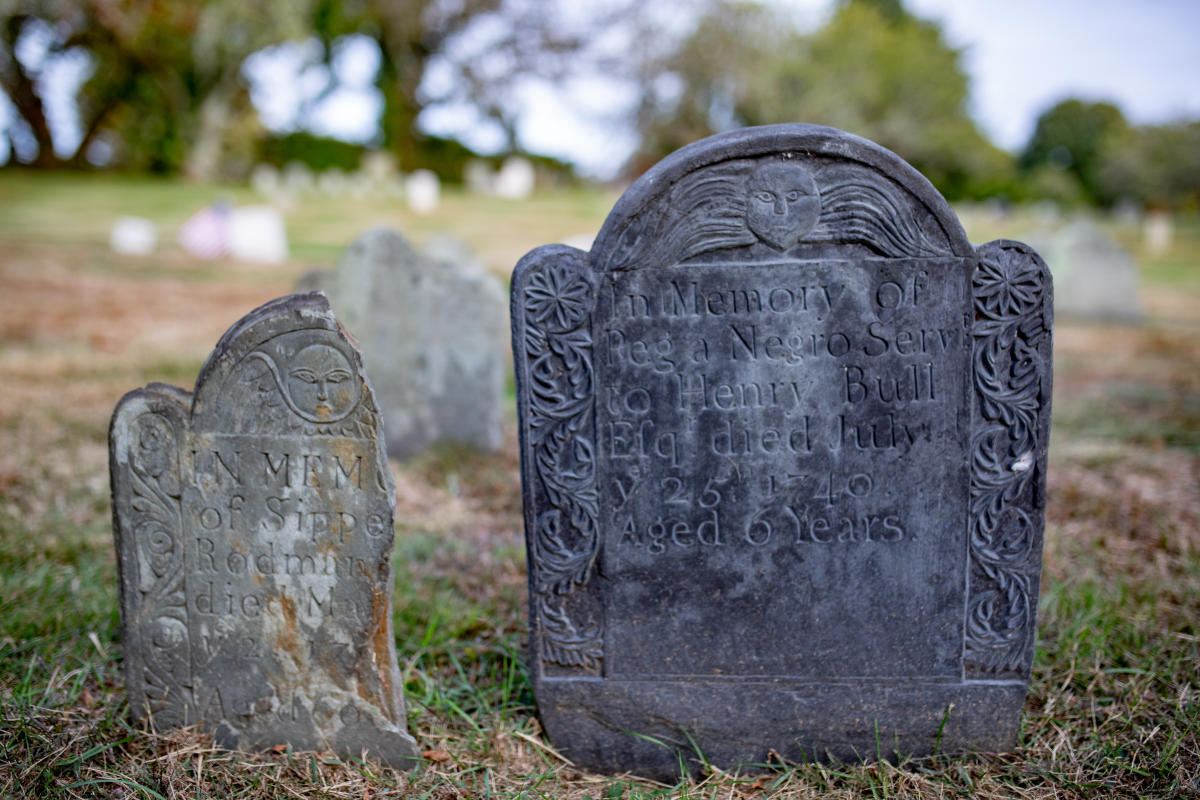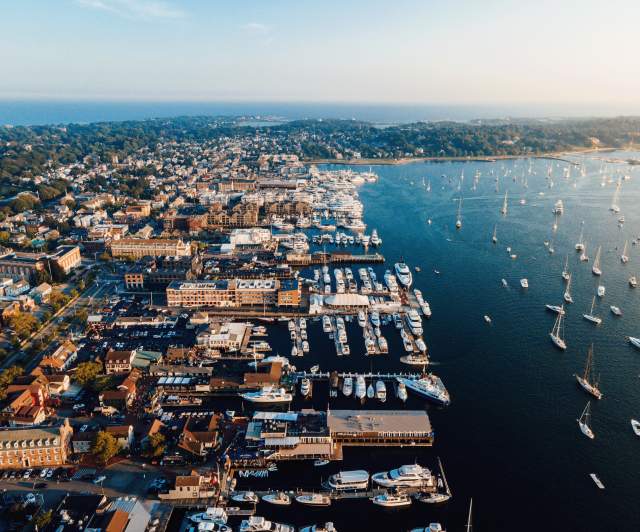February is known as Black History Month, an annual time that celebrates the history, heritage and diversity of the Black community with special virtual events, lectures and walking tours throughout The Classic Coast.
Black History Month Events
Newport Live Presents: Reverend Robert Jones, Sr.
Back to Top of List- Where:
- Jamestown Arts Center
- When:
- February 10th at 7:00 PM
- Cost:
- $35 General Admission
Enjoy an unforgettable performance by Robert B. Jones, Sr. celebrating the blues, Black History Month, and Reverend Robert Jones special brand of storytelling.
More Details
Black History Month Medallion Installation and Ceremony
Back to Top of List- Where:
- The Zabriskie Memorial Church of Saint John the Evangelist (St. John's, Newport), 61 Poplar St, Newport, RI
- When:
- February 25 from 1:00 pm - 2:00 pm
Black History Month Medallion Installation and Ceremony at Saint John Episcopal Church in the Point neighborhood of Newport, to honor church founder Peter Quire who worked on the Underground Railroad. RI Congressman Gabe Amo will be the guest speaker.
MORE DETAILS
Guardians of Liberty
Back to Top of List- Where:
- Channing Memorial Church, 135 Pelham St, Newport, RI
- When:
- February 28
Lecture by Robert A. Geake, Board Member and Past President at Smith's Castle with Charles Roberts, Executive Director of RISHM as the emcee.
Sponsored by BORI and RISHM.
MORE DETAILS
Creative Survival Walking Tour
Back to Top of List- Where:
- TOUR DEPARTS OUTSIDE OF THE MUSEUM OF NEWPORT HISTORY
- When:
- February 18th from 11:00 am - 12:00 pm
- Cost:
- NON-MEMBERS: $20, MEMBERS/ACTIVE & RETIRED MILITARY: $15, CHILDREN: $10
Discover the early history of Newport’s people of color, enslaved and free. Explore the places where enslaved people lived and labored, along with locations where free African Americans built their enterprises and supported a new local industry.
Tours depart outside of the Museum of Newport History at the Brick Market, located at the foot of Washington Square, 127 Thames Street, Newport RI. Attendees should look for a sign indicating where to check in with the guide and depart for the tour to the north of the building near the flagpoles. Space is limited, advance registration is required.
MORE DETAILS
ONGOING AT THE NEWPORT HISTORICAL SOCIETY
The Know Your History initiative at Newport Historical Society is a hub for resources to connect audiences with historical information that is relevant to the history we are making now. Currently the hub is featuring resources on Newport and Rhode Island’s history relative to people of African descent, Native Americans, the history of protest and suffrage, and religious toleration.
MORE DETAILS
Digital Exhibit Breaking Boundaries In Black Tennis
Back to Top of List- Where:
- VIEW ONLINE AT BREAKINGBOUNDARIES.TENNISFAME.COM
- Cost:
- FREE
The International Tennis Hall of Fame has launched its newest digital exhibit, Breaking Boundaries in Black Tennis, which highlights the breakthroughs, evolution, and impact of Black tennis players and influential contributors to the sport globally.
The initial launch of Breaking Boundaries features 70 individuals representing 19 nations, and will continue to expand with many more inspiring stories to be added on an ongoing basis. Fans are also encouraged to submit their own suggestions of athletes and contributors for inclusion through a form included in the exhibit.
Visitors to the exhibit can browse athletes’ and contributors’ profiles by navigating an interactive map grouped by region. Breaking Boundaries features biographical information and interactive profiles that highlight the on-court achievements and the lasting impact of players’ successes on the sport of tennis.
MORE DETAILS
Must-Try Black-Owned Restaurant
- 104 Broadway
- (401) 619-0032
Humming Bird is a hidden gem in Newport. Known throughout the island for their authentic Caribbean-style home cooking! The menu is filled with many Caribbean and Jamaican essentials like Oxtail, Jerk Chicken & Patty Crusts! Experience the bold & flavorful hot plates today!
Rhode Island Slave History Medallion
The Rhode Island Slave History Medallion organization is a statewide public awareness program committed to marking those historic sites connected to the history of slavery in Rhode Island. Slavery was the global economic engine prior to its abolition and Rhode Island’s role in this business of slavery was significant. By marking sites throughout the state that are connected to that past, we hope to make that history easily accessible by telling a more complete story of the cultural and economic development of the State of Rhode Island.
In each city or town, a QR coded Medallion with the history of its designated locations will appear on the website. The QR code on the Medallion will provide a link to this website with historical content about each location.
Learn the untold stories of Rhode Island’s role as one of the first and pivotal slave states, as you visit authentic places from America’s notorious past.
Newport
Back to Top of ListBowen’s Wharf, In the 18th century, the city of Newport was a major hub of the North American slave trade. During that time in present day Bowen’s Wharf, slaves arrived and departed in sailing ships and labored in trades related to maritime commerce, including serving as shipbuilders, sailors, caulkers, sailmakers, carpenters, rope-makers, painters, barrel-makers and dock workers.
More Details
John Stevens Workshop, John Stevens II (1702-1778) was a skilled craftsman, cutter of gravestones, and stone and brick mason. Like all artisans in colonial Newport, he supplied the maritime traders, particularly the African and West Indies slave trade. The shop today houses the business of renowned stone carver Nicholas Benson.
More Details
“God’s Little Acre,” a section of the Newport’s Common Burying Ground is where you’ll find the largest surviving collection of burial markers of enslaved and free Africans. This historic burial ground is the final resting place of 17th and 18th Century African slaves and free persons of color who contributed greatly to the commerce, society, and religious life of Colonial Newport.
More Details

Jamestown
Back to Top of ListEast Ferry Wharf, Jamestown Rhode Island was a special place for commerce and transit across southern New England. However, slavery also tread this path through Jamestown for almost two centuries. Jamestown is a neighbor to Newport, the originator of the largest number of American-owned slave voyages in the nation.
More Details
Portsmouth
Back to Top of ListPatriots Park, this park is the site of the Battle of Rhode Island and has been designated a National Historic Landmark, by the National Park Service, United States Department of the Interior. It commemorates the historic battle of the Revolutionary War. It has a memorial to the 1st Rhode Island Regiment, and The Battle of Rhode Island, August 29, 1778.
The Bloody Run Brook is where the First Black Militia fought, and the site honors the first Black slaves and freemen who fought in the Battle of Rhode Island as members of the First Rhode Island Regiment; The Black Regiment. Located at the intersection of West Main Road (Rhode Island Route 114) and Rhode Island Route 24 on West Main Road.
More Details
Bristol
Back to Top of ListThe DeWolf Tavern is cloaked in a renovated 1818 coffee and sugar warehouse constructed from repurposed slave ship ballast. Bristol-based maritime merchants James and William DeWolf built the warehouse and attached distillery for their “Triangle Trade” enterprise. Remnants of wooden barrels used in making rum were unearthed during the building’s restoration and one is on display on site.
More Details
Visit Lindon Place, the family home of the DeWolf’s for a revealing look at the family’s involvement in the Slave Trade. Tour highlights include tales of DeWolf family exploits, from their privateering and slave trading to their financial ruin and triumphant return to prosperity during Victorian times. Visitors are welcome to stroll the sculpture-filled gardens where they will find Greek bronzes and an 18th Century gazebo.
More Details
Warren
Back to Top of ListThe Eddy-Cutler House, 30 State Street, was built circa 1806-1812 by Warren merchant and slave trader Benjamin Eddy. Captain Eddy was an owner and captain of at least three slave voyages, the snow Eliza in 1801 and the ship Agent in 1806 and 1807.
Eddy purchased the property only months after delivering 139 captives to the Charleston docks in June 1806, and before leaving in September for another journey to Africa.
More Details
The James Driscoll House, 26 State Street, is a three story Federal Mansion built by James Maxwell for his daughter Hannah Maxwell Driscoll, traditionally said to have been a wedding present. The property was sold to him by John Child in 1806.
James Maxwell was a sea captain and slave trader in the Triangle Trade and reputed to be one of the wealthiest men in Warren.
A large part of Maxwell’s wealth may be attributable to the sale of enslaved captives, such as those aboard Maxwell’s schooner Abigail, which left Warren in September 1789. The captain of the vessel, Charles Collins, purchased 64 slaves on the coast of Africa, and sold them in the Americas by June of 1790. Of the 64 captives embarked on the ship, only 53 survived the voyage.
More Details
Barrington
Back to Top of ListThe history of slavery in Barrington spanned a period of nearly two hundred years and predates the establishment of the town itself. Slavery continued throughout the eighteenth century. The 1774 census documents a population of 601, with 57 enslaved peoples, including 18 people listed as “Indian.” At least 12 enslaved people from Barrington, including Scipio Freeman, fought for their freedom during the Revolutionary War with the First Rhode Island Regiment.
More Details
more to explore
GET SOCIAL
Tag your photos #TheClassicCoast for the chance to be featured on our accounts.
























